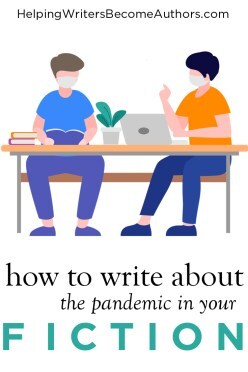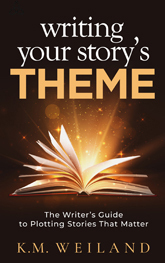How to Write About the Pandemic (or Not)
 Note From KMW: For almost two years now, a question I have frequently received from readers is: “How to write about the pandemic?” Most often, I’ve heard this question from those who are (or were) writing stories set in the present day or the near future.
Note From KMW: For almost two years now, a question I have frequently received from readers is: “How to write about the pandemic?” Most often, I’ve heard this question from those who are (or were) writing stories set in the present day or the near future.
Now that both have changed, perhaps forever, in ways both subtle and dramatic, authors are confronted with many choices about how they adapt their fiction to our rapidly changing landscape. Even some historical and speculative authors are having to make adjustments—as in, for instance, stories about plagues (whether historical or speculative).
Today, I’m pleased to be sharing a guest post from editor Harrison Demchick, in which he offers four pertinent musings about how you can avoid writing directly about the pandemic if that’s what you determine is best for your story, no matter its genre.
***
The universe allows few opportunities for true collective trauma, but COVID-19 has been a rare and most unwelcome exception. Between 2020 and 2021, it kept us locked inside and removed from friends and family. It’s cost us far too many lives. And just when we thought it was on a downward slope, along came Delta and Omicron, sending us spiraling into anxiety all over again.
After two years in the midst of a pandemic, authors as much as anyone need a way to process what they’ve been through. That could mean writing about the pandemic. But it could also mean just the opposite.

The Listeners by Harrison Demchick (affiliate link)
When my first novel The Listeners was published back in 2015, the notion of a pandemic-fueled dystopia seemed very much the stuff of science-fiction. More than once in the course of the last couple years I’ve joked about how I should have waited a few more years to seek publication—long enough to take advantage of this free firsthand research we’ve all been forced to undertake.
But—would I write the same novel today? Should you? A fictional pandemic may well hit too close to home. Escapism may be preferable to realism. And readers undergoing their own version of this same collective trauma may want to read about absolutely anything else.
So how to write about the pandemic and deal with the pandemic without actually writing about the pandemic?
Write What You KnowI’ve written on this subject before, but the classic literary aphorism write what you know is badly misunderstood. It can be taken literally, in that a retired police detective may be inclined to write mysteries or a nurse on the front lines of the pandemic might write directly about managing patients in a hospital in dangerous circumstances.
But it’s not just a matter of personal circumstance. It’s also about personal experience.
You don’t need to write about a pandemic to address, say, a kid isolated from his friends. Maybe he’s moved to a new town, or maybe he’s been abducted by aliens. But either way, the experience of finding yourself suddenly physically removed from those you love is something many people understand far better than they did two years ago. As an author, you can use the emotional realities of social distancing to help you empathize with this character in what seems on the surface an unrelated story.
That’s writing what you know—only in a different way.
Just because readers are sick and tired of reading about diseases and quarantines doesn’t mean they’re sick and tired of reading about heartbreak or loss, or the helplessness that comes with unexpected change. One of the best ways to write about the pandemic without writing about the pandemic is using the feelings of the last couple years to help define your characters, whatever their individual circumstances may be.
Consider Themes—Subtly
Writing Your Story’s Theme (Amazon affiliate link)
The trauma of the COVID-19 pandemic may be collective, but that doesn’t mean we’ve all experienced it exactly the same way. The last couple years have exposed many of the rifts and inequities in our society, and responses to it have been disconcertingly polarized. Maybe these ideas are arguments you want to make in your writing. That would make them essentially themes. What’s important about themes in fiction is that they’re usually best when approached as subtext.
That means that instead of making these arguments directly, we convey them on the page perhaps in a context entirely removed from the pandemic we’re facing at present. Instead of lionizing characters who share our own positions and vilifying those who don’t, we craft well-rounded characters and guide them through the events of the narrative toward the truths you mean to reveal.
In other words: Show, don’t tell. If you want to tell, you can give a lecture or write a Facebook post. Try lecturing in a story and readers will tune out, especially those who don’t already share your views—often the very people you mean to convince. The entire reason we present issues and themes in story is because a story has the power to show and guide rather than lecture and explain.
Get Ahead of the CurveIf you do want to tackle the pandemic more directly, and you don’t want to be subtle about it, then one idea you might consider is to write not about the pandemic as it’s been, or as it is now, but instead as it will be—or how you imagine it will be.
Will things ever be truly the way they were before March 2020?Or will there be a new normal?What will life be like five or ten years from now?Will masks be more common?Remote learning more frequent?It’s important to consider that this speculative thinking is not just limited to speculative fiction. Any time we write a story set in more or less the present day, that present day comes with a wide set of assumptions based on everyday life as we currently understand it. Characters go to the park or the movies, or work at an office or a restaurant or the zoo, because these are things people do. However, present-day fiction has rarely revealed the collective awareness of lives upended by a shared trauma like COVID-19 because up to this point such a scenario has been inconceivable, or at least the exclusive purview of science-fiction.
These days, everyday looks different. The pandemic is an event that will live in the collective consciousness of all future real-world characters for many years to come. Maybe that’s very relevant to the story you want to tell. Maybe it’s a passing detail. Either way, awareness of it makes the pandemic part of the stories you write regardless of whether it is in fact the story.
Do What You WantOf course, if you want to just flat-out write a pandemic story, write a pandemic story. That’s okay too. Odds are good that a lot of authors are doing the same—shared experience will do that. You’ll do it your own way, following your own muse, and that’s fine. COVID-19 will inspire many more stories than those that are obvious about it, and there are a world of ways to tackle the experience without denying would-be readers the escape they seek.
In that way, maybe these stories can be as well the escape you seek.
Wordplayers, tell me your opinions! How has the pandemic affected your writing? Tell us in the comments!The post How to Write About the Pandemic (or Not) appeared first on Helping Writers Become Authors.



